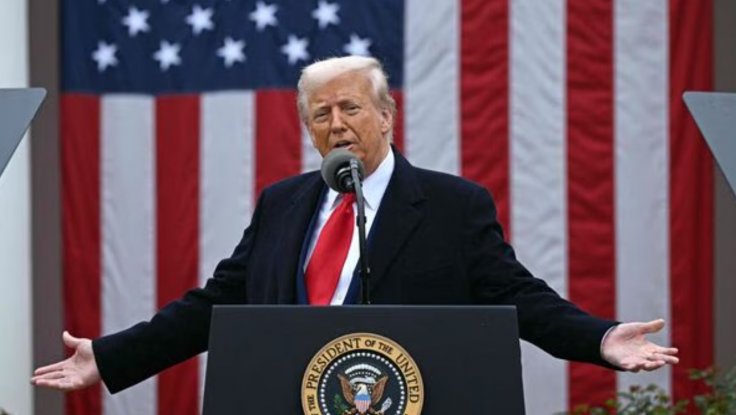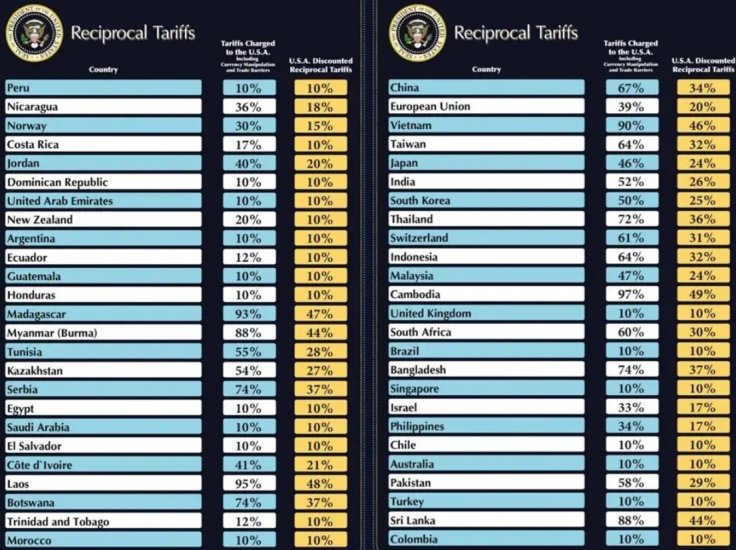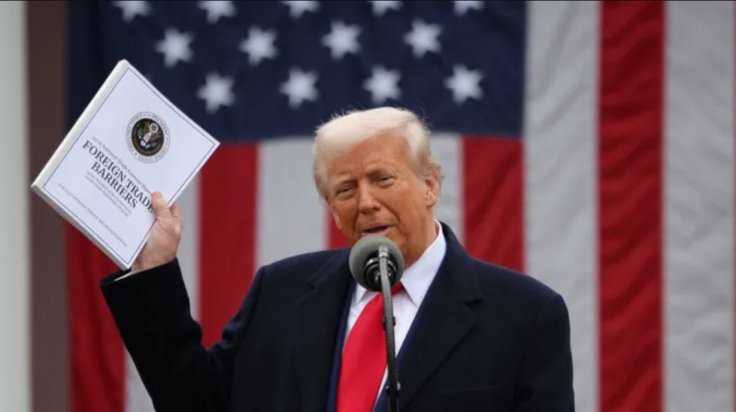President Donald Trump announced a national emergency on Wednesday to enforce his extensive "Liberation Day" tariffs, which will apply to nearly all imports. The plan introduces a new standard tariff rate of 10%, along with stricter "reciprocal" levies targeting multiple nations, including key allies like Japan, Israel, and European Union member states.
Describing the decision as a "Declaration of Economic Independence," Trump timed the announcement for 4 p.m. ET, in a cautious move as the stock market had closed for the day. "This is one of the most important days, in my opinion, in American history. It's our Declaration of Economic Independence," the president, 78, said in the Rose Garden.
No One Will be Spared by Trump

"Factories will come roaring back into our country — and you see it happening already. We will supercharge our domestic industrial base. We will pry open foreign markets and break down foreign trade barriers."
The newly introduced 10% baseline tariff is about three times higher than the average U.S. tariff rate before Trump returned to office in January and is set to go into effect at 12:01 a.m. on Saturday.

Additional reciprocal tariffs will be implemented after midnight on April 9. These include a 20% duty on goods from the 27-member European Union, a 24% tariff on Japanese imports, and a 17% levy on Israeli products. These rates are said to be around half the combined tariff and non-tariff restrictions these nations impose on U.S. exports, particularly in cases where the U.S. runs trade deficits.
"We will charge them approximately half of what they are and have been charging us," Trump said of the reciprocal tariffs.
"Ultimately more production at home will mean stronger competition and lower prices for consumers. This will indeed be the golden age of America."
🚨 TRUMP: “We will establish a MINIMUM baseline tariff of 10 percent. That'll be on other countries to help rebuild our economy.â€
— Nick Sortor (@nicksortor) April 2, 2025
🇺🇸🇺🇸🇺🇸 pic.twitter.com/xDdZbwTehb
Trump criticized both foreign tariffs and non-tariff trade barriers, pointing to Australia's limits on U.S. beef, the European Union's poultry bans, and Japan's charges on rice imports. Since the U.S. maintains a trade surplus with Australia, the country was only subjected to the lower 10% baseline tariff.
"From 1789 to 1913, we were a tariff-backed nation and the United States was proportionately the wealthiest it has ever been," Trump said.
"In 1913, for reasons unknown to mankind, they established the income tax so that citizens, rather than foreign countries, would start paying the money necessary to run our government. Then in 1929, it all came to a very abrupt end with a Great Depression, and it would have never happened if they had stayed with the tariff policy."
He continued: "If imposing tariffs and protective barriers made nations poor, then every country on Earth would be racing to eliminate these policies."
"To all of the foreign presidents, prime ministers, kings, queens, ambassadors and everyone else who will soon be calling to ask for exemptions from these tariffs, I say, 'Terminate your own tariffs, drop your barriers'," the President continued.
"April 2, 2025, will forever be remembered as the day American industry was reborn, the day America's destiny was reclaimed, and the day that we began to make America wealthy again."
Almost All Nations to Feel the Tariff Heat
Several countries are facing tariff rates higher than the 10% baseline, including Cambodia at 49%, India at 26%, Iraq at 39%, South Africa at 30%, South Korea at 25%, Sri Lanka at 44%, Switzerland at 31%, Taiwan at 32%, Thailand at 36%, and Vietnam at 46%.

"For decades, our country has been looted, pillaged, raped and plundered by nations near and far, both friend and foe alike," Trump said.
Trump said that the broad tariffs were expected, emphasizing, "I've been talking about it for 40 years."
The announcement shook after-hours trading, causing S&P 500 futures to drop 1.7%, Nasdaq 100 futures to fall 2.5%, and Dow Jones Industrial Average futures to decline 0.7% as Trump wrapped up his remarks.
Opponents warn that the new tariffs will lead to higher costs for American consumers, further driving inflation after prices surged by 22% during Joe Biden's four-year term.
Trump cited the low inflation during his first term—when he implemented more selective tariffs on foreign goods—as proof that prices may not rise significantly under his protectionist trade measures.
During his speech, he also urged congressional Republicans to support his proposals to eliminate federal taxes on tips, overtime pay, and Social Security benefits, as well as to allow tax deductions for interest on domestic car loans.
According to White House officials, the 10% baseline tariff was introduced to prevent countries labeled as the "worst offenders" from bypassing the stricter trade penalties. The administration pointed to China as an example, accusing it of using factories in Cambodia and Vietnam to repackage goods before shipping them to the U.S.
Despite being a key beneficiary of American military aid, Israel faced a significant tariff after the U.S. recorded a $7.4 billion trade deficit with the country last year. "Israel steals a lot of intellectual property from, for example, the pharmaceutical manufacturers in this country," an administration official said ahead of Trump's announcement.
Last month, Trump imposed an additional 25% tariff on China in response to fentanyl smuggling. In February, he also introduced a 25% tariff on steel and aluminum, removing previous exemptions for major suppliers like Brazil and South Korea.
Around 43% of U.S. imports, by value, originate from Canada, China, and Mexico, with each of these countries accounting for between 13% and 16% of total imports.

The relationship between China's new "reciprocal" tariff rate of 34% and the existing, even higher tariffs on Beijing remains unclear.
Germany and Japan each contribute around 5% of U.S. imports, while Vietnam and South Korea account for about 4% each. Ireland, India, Italy, and France follow closely behind.
Trump has also hinted at potential tariffs on computer chips, copper, lumber, and pharmaceuticals—products that were specifically excluded from Wednesday's country-specific reciprocal tariffs.









